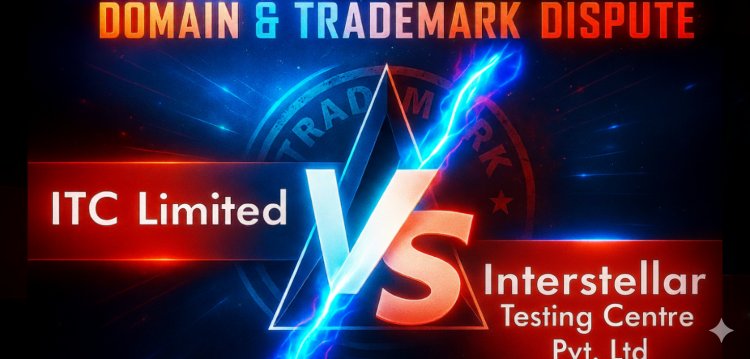ITC Limited v. Interstellar Testing Centre Pvt. Ltd, a dispute over Domain and trademark
This article discusses the legal case ITC Limited v. Interstellar Testing Centre Pvt. Ltd. concerning trademark infringement and passing off due to the defendant's use of the name "ITC LABS" and the domain “www.itclabs.com”. The plaintiff sought immediate relief, claiming urgency sparked by confusion in January 2022, despite the defendant's established use of the mark for over three decades. The court scrutinized the plaintiff's request to bypass pre-institution mediation mandated by the Commercial Courts Act, 2015, revealing that the plaintiff had not disclosed critical prior interactions with the defendant. The decision emphasized the necessity for full disclosure and honesty in legal pleadings, leading the court to revoke the dispensation from mediation and stay the suit. Both parties are now required to engage in mandatory mediation, highlighting the importance of collaboration and resolution in intellectual property disputes.

The present lawsuit of ITC Limited v. Interstellar Testing Centre Pvt. Ltd., (IP-COM/42/2024 [Old No CS/159/2022]), is by the plaintiff for trademark infringement and passing off, targeting the defendant's use of the name "ITC LABS" and the domain www.itclabs.com. The defendant has been using this mark and domain for over three decades, with a consistent and open presence, including documented interactions on social media and in business with the plaintiff since at least 2011. The plaintiff is seeking urgent interim relief, arguing that actual confusion only emerged in January 2022, following a letter from a third party. However, previous interim restraint orders granted to the plaintiff were overturned after it was revealed that there had been a lack of disclosure regarding earlier dealings between both parties.
When the suit was filed, the plaintiff requested and received permission to bypass the mandatory pre-institution mediation requirement under section 12A of the Commercial Courts Act, 2015. However, the defendant contested this decision, filing an application to revoke the dispensation. They claimed that the plaintiff exhibited false urgency and withheld important information. It's worth noting that the Court had previously lifted the ex parte interim relief because the plaintiff did not disclose some significant prior dealings.
ISSUES
- Was the dispensation from pre-institution mediation under section 12A granted to the plaintiff in a valid manner?
- Was there enough urgency to warrant skipping the mediation requirements?
- Did the plaintiff withhold any important facts that were relevant to the application for dispensation?
ARGUMENTS
The defendant argued that the plaintiff has claimed urgency in this case, but it's important to note that they did not disclose their longstanding business dealings with the defendant. There is substantial documentary evidence showing that the plaintiff was aware of the defendant's use of "ITC LABS" prior to 2022. Additionally, the case of, Dhanbad Fuels v. Union of India (2025) and Patil Automation, was referred which support the notion that the suit should be stayed and that mediation should be pursued. On the other side, the plaintiff argued that Mediation wasn't necessary in this case because there was an urgent need for interim relief. It’s important to note that actual confusion and the cause of action only emerged in January 2022. There was no suppression or concealment involved; just because some employees were aware of the mark doesn’t mean the entire company had that knowledge.
To know more about this you can folllow the link below:
Relevant Law
Section 12A of the Commercial Courts Act, 2015 mandates pre-institution mediation for commercial suits unless urgent interim relief is requested. There is no specific exception for intellectual property matters.
FINDINGS
In the recent findings, it was determined that the plaintiff had direct knowledge of the defendant's use of the disputed mark and domain name due to previous documented interactions. The claim that the plaintiff only became aware of this in January 2022 was found to be misleading and lacked factual support. Additionally, the failure to disclose these prior dealings was seen as a suppression and distortion of essential information. The urgency claimed by the plaintiff was described as "camouflaged," since the cause of action could not be accurately said to have originated solely in 2022. Following the legal principles established in the case of Dhanbad Fuels, it was noted that any suits filed before August 20, 2022, that did not comply with Section 12A must be stayed and referred to mediation.
DECISSION
The court revoked the dispensation from section 12A of the Commercial Courts Act. As a result, the suit (IP-COM/42/2024) has been stayed while both parties are required to engage in mandatory mediation. They have been given a timeframe of three months from the date of the order to complete this process. After the mediation, there will be an opportunity for either party to seek further orders if needed. Additionally, the defendant's application, GA/2/2022, was allowed. This approach encourages collaboration and resolution between the parties involved.
Conclusion
The court's decision in ITC Limited v. Interstellar Testing Centre Pvt. Ltd. underscores the importance of adhering to the mandatory pre-institution mediation requirements outlined in Section 12A of the Commercial Courts Act, 2015. It establishes that the claim of urgency must be substantiated by genuine circumstances, and any attempt to bypass mediation without full disclosure of prior dealings will not be tolerated. The ruling reinforces the notion that parties in intellectual property disputes must engage in transparent communication regarding their history, as suppressing critical information can undermine their position. By emphasizing the need for mediation, the court encourages a collaborative approach to dispute resolution, which could lead to mutually beneficial outcomes. This decision serves as a reminder for litigants to thoroughly evaluate their positions and ensure that they act in good faith throughout the legal process, fostering a fair and just legal environment.












